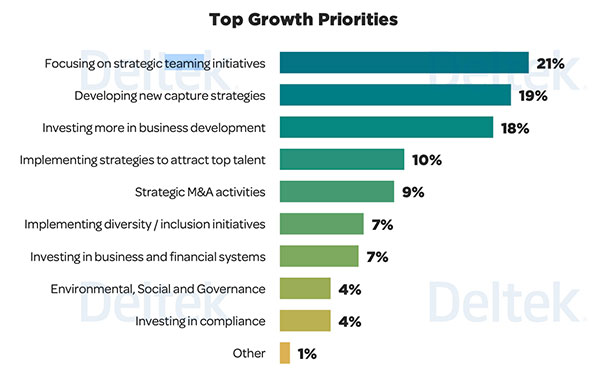Developing good teaming relationships is the key to success for government contractors – building credibility in a challenging atmosphere.
By AJ Jernigan, Solutions Engineer, Deltek
Many private sector organizations are looking at government contracting as a way to diversify their businesses in the face of macroeconomic pressures. However, the federal government has grown increasingly selective about who it works with, and breaking into government contracting isn’t as easy as it might seem.
That’s where teaming agreements enter the picture. A teaming agreement is an arrangement in which a small business enters a partnership with a larger business to subcontract work on a government bid or request for proposal (RFP). These agreements are one of the most common avenues for new contractors to win business.
However, teaming agreements can fall short of their goals if businesses fail to prioritize best practices for collaboration. To increase the likelihood of success, businesses must select teaming partners that are the right fit and then develop and maintain healthy working relationships over time.
Credibility is a prerequisite for businesses that work with the federal government. The government simply won’t risk working with unproven contractors when millions of dollars are on the line, so contractors must be able to demonstrate their reliability.
Contractors can establish their credibility in one of two ways. First, they can show proven federal contracting experience related to the work outlined in the RFP — work in the private sector or state and local government carries little weight.
But what about businesses that are attempting to secure their first contract with the federal government? Since these organizations aren’t able to point to previous federal contracting experience, the second option is really their only option: demonstrating they have worked with a partner that does have proven government experience through a teaming agreement.

While teaming agreements are the primary option for new contractors, these partnerships can easily fizzle out if partners struggle to collaborate effectively. For example, one party may grow complacent and fail to meet with their partner on a regular basis. Remote work can also strain the relationship, with contractors citing a lack of face-to-face communication as the greatest business development challenge they face.
Another problem contractors face is scope creep, a phenomenon in which the project begins with one deliverable in mind and eventually splinters or grows into multiple deliverables. Scope creep can lead to missed deadlines, communication silos, and decreased profitability.
Without effective processes and documentation, less-established contractors may also find themselves stuck in an exploitative teaming environment. Rather than developing a true mentor-protege relationship, the more established contractor can take advantage of the smaller contractor for their labor instead of serving as an advisor or teacher.
Navigating modern teaming relationships is a difficult task for any contractor, but it can be especially daunting when you’re making your first foray into federal contracting. However, developing strong teaming relationships with experienced contractors is essential if you want to become eligible to bid on government work and diversify your business.
Here are three pieces of advice to keep in mind as you enter the world of government contracting:
Teaming is the most realistic path forward for securing your first contract with the federal government. However, you need to remain intentional about vetting potential partners and developing teaming relationships over time for it to be successful.
Ultimately, the bid process is far too competitive to work with a partner that doesn’t have your back. The ideal teaming agreement is one where both parties learn from each other and plug the other’s knowledge and skill gaps. To make this vision a reality and secure contracting opportunities, leverage technology that allows you to identify potential teaming partners, as well as the ideal RFPs that you should pursue together.

As a solutions engineer at Deltek, AJ Jernigan is a business development and growth expert committed to government contractor client success. His role is laser-focused on understanding the issues government contractors face and addressing them with tailored technological solutions, and he’s presentednumerous talks on the future of government contracting and teaming initiatives. With more than a decade of managerial experience, AJ has a proven track record of outlining a path to success for the many projects he supports.
In this episode, I sat down with Beejan Giga, Director | Partner and Caleb Emerson, Senior Results Manager at Carpedia International. We discussed the insights behind their recent Industry Today article, “Thinking Three Moves Ahead” and together we explored how manufacturers can plan more strategically, align with their suppliers, and build the operational discipline needed to support intentional, sustainable growth. It was a conversation packed with practical perspectives on navigating a fast-changing industry landscape.